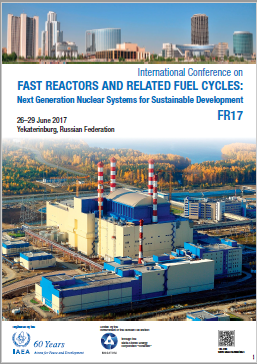Speaker
Jaeseok Heo
(Korea Atomic Energy Research Institute)
Description
In this research, uncertainty analyses for multiple safety parameters were performed for Unprotected Loss of Flow (ULOF) for the Prototype Gen-IV Sodium-cooled Fast Reactor (PGSFR) by using the PArallel Computing Platform IntegRated for Uncertainty and Sensitivity analysis (PAPIRUS). The objective of the global uncertainty analysis is to evaluate all safety parameters of the system in the combined phase space formed by the parameters and dependent variables. The uncertainty propagation was performed by mapping the uncertainty bands of the model parameters through the MARS-LMR to determine the distributions for the fuel centerline, cladding, and coolant temperatures. The Best Estimate Plus Uncertainty (BEPU) analysis adopted for uncertainty quantification of the code predictions has been performed through a statistical approach where the Figure of Merit (FOM) is evaluated multiple times by using several combinations of parameters that are randomly generated according to their distributions. The statistical approach of uncertainty quantification is known to be very powerful for estimating response distributions, but sometimes inapplicable owing to demanding calculation requirements. In this research, Wilks’ formula was used to estimate the 95% probability value of the FOM from a limited number of code calculations. This paper also introduces the application of data assimilation in best-estimate modeling to improve the prediction of the reactor system performance by refining various sources of uncertainties through model calibration technique. An inverse problem was formulated based upon Bayes theorem and solved to estimate the posteriori distributions of parameters.
Country/Int. Organization
South Korea/Korea Atomic Energy Research Institute
Primary author
Jaeseok Heo
(Korea Atomic Energy Research Institute)
Co-author
Dr
Sung Won Bae
(KAERI)

